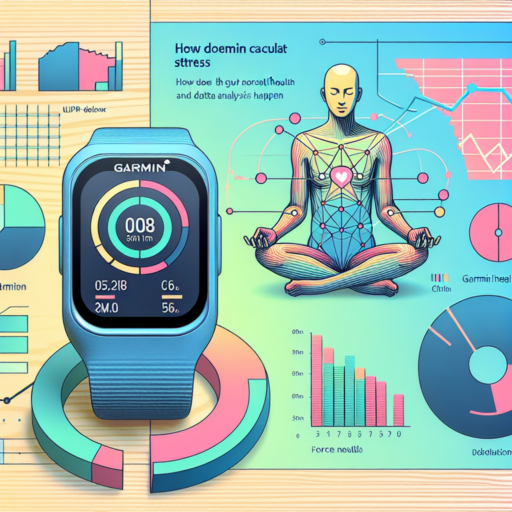How does Garmin measure stress levels?
Garmin devices utilize a sophisticated method to measure stress levels, primarily focusing on Heart Rate Variability (HRV). This metric, HRV, is essential as it represents the time variation between each heartbeat. Variations in this interval can indicate levels of stress or relaxation within the body.
Heart Rate Variability (HRV) is analyzed through a technology called photoplethysmography, which is employed in Garmin’s wearables. This technology uses a light-based sensor to monitor the flow of blood through the skin, allowing the device to estimate changes in blood volume during heartbeats and thus calculate HRV. HRV is a direct window into the autonomic nervous system’s workings, showcasing how the body is responding to various stressors, both physical and psychological.
To provide a user-friendly interpretation of these HRV readings, Garmin devices display stress levels on a scale. This scale usually ranges from «low» to «high,» depicting the user’s current stress state. The measurement technique is continuous, enabling users to monitor their stress levels throughout the day and observe how different activities or rest periods affect their stress.
No se han encontrado productos.
How accurate is the stress test on Garmin?
The accuracy of the stress test on Garmin devices often sparks considerable discussion among users. These devices utilize heart rate variability (HRV) to measure stress levels, which is a method recognized widely for its potential to offer insights into the autonomic nervous system’s activities. The technology behind Garmin’s stress test primarily focuses on analyzing the time interval between heartbeats, supposedly reflecting the user’s physical and emotional stress levels at any given moment.
Factors Affecting Accuracy
Several factors can influence the accuracy of Garmin’s stress test. First and foremost, the positioning of the watch on the user’s wrist can significantly affect the HRV readings, as improper placement may lead to inaccurate measurements. Moreover, the user’s personal physical condition and lifestyle choices, such as levels of hydration, caffeine intake, and sleep quality, can also alter the test’s outcomes. Garmin suggests wearing the device consistently to ensure more accurate stress level readings by capturing a comprehensive overview of the wearer’s physiological patterns over time.
Furthermore, it’s crucial for users to understand that the Garmin stress test is not a medical diagnostic tool but rather a wellness feature designed to aid in personal health and stress management. The test’s accuracy is generally considered to be high within the context of wearable technology. However, it should be noted that individual experiences may vary due to the complex nature of stress and its manifestations in the human body. Users are encouraged to use the data from Garmin’s stress test as a guide rather than an absolute measure of their stress levels.
Why are my stress levels so high when I sleep?
Sleep is supposed to be a time of rest and recovery, yet many find themselves grappling with high stress levels during what should be the most tranquil part of their day. This paradoxical situation is unfortunately not uncommon, with several factors contributing to heightened stress levels during sleep. Understanding these factors can be the first step towards mitigating their impact.
Possible Causes of Elevated Stress Levels While Sleeping
- Poor Sleep Hygiene: Inconsistent sleep schedules and engaging in stimulating activities close to bedtime can signal to your brain that it’s time to be alert, not restful. This confusion can elevate stress levels.
- Overexposure to Screens: The blue light emitted by screens can interfere with your circadian rhythm and suppress melatonin production, making it harder to fall asleep and increasing stress.
- Daily Stressors: Unresolved worries or stress from the day can follow you to bed, making it difficult to find the peace necessary for restorative sleep.
Additionally, sleep disturbances, such as nightmares or sleep apnea, can contribute to an elevated stress response during the night. These disturbances not only interrupt sleep but also trigger a stress response in the body, which can perpetuate a cycle of stress and disrupted sleep.
Addressing these underlying issues often requires a multifaceted approach, focusing on both improving sleep hygiene and managing stress throughout the day. By doing so, it becomes possible to lower stress levels while asleep, leading to a more restful night and more rejuvenated mornings.
Why is my stress level so high?
Understanding why your stress level is so high begins with acknowledging the multifaceted nature of stress itself. It’s a product of both external pressures and internal responses. In today’s fast-paced world, it’s no surprise that stress levels are on the rise. From job security concerns to maintaining social relationships, there are myriad sources of stress. Moreover, the digital era has introduced an always-on culture, where the lines between work and rest blur, amping up stress levels even further.
Diet and Lifestyle play a significant role in managing stress levels. Poor dietary choices and a sedentary lifestyle can exacerbate feelings of stress, creating a vicious cycle that’s hard to break. Consuming excessive amounts of caffeine and sugar, for instance, can heighten stress by increasing the body’s cortisol levels, the stress hormone. Conversely, physical activities, especially those in nature, can act as potent stress reducers, enhancing overall well-being.
Another key factor contributing to elevated stress levels is sleep quality. Inadequate or disturbed sleep affects the brain’s ability to cope with stressors effectively. It diminishes cognitive functions and emotional resilience, making even minor stressors seem overwhelming. Establishing a regular sleep routine and fostering a sleep-conducive environment are crucial steps towards mitigating stress.




